This is the fourth in a series of articles on the recent Sydney film festival. [Part 1] [Part 2] [Part 3]
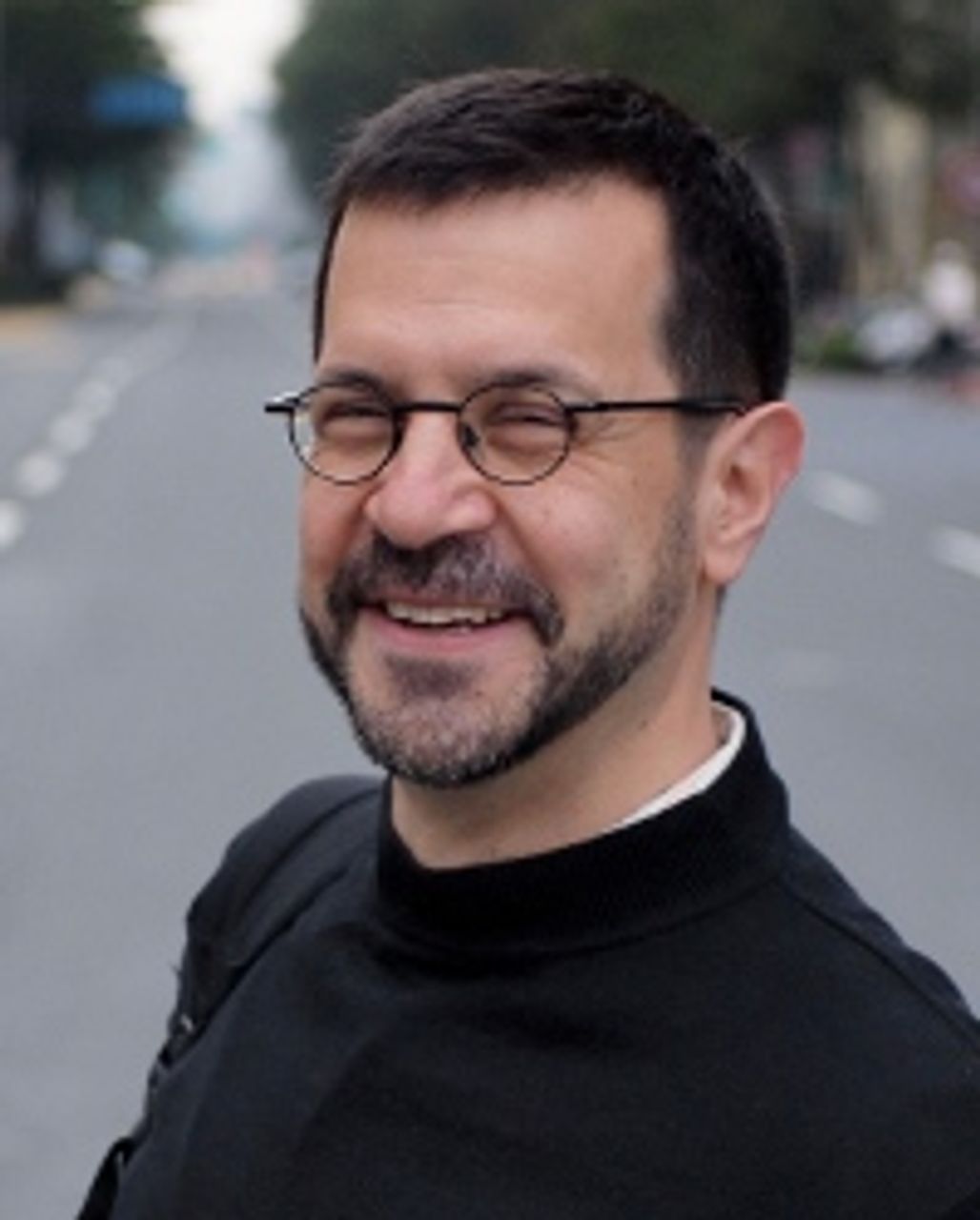 Shelly Kraicer
Shelly KraicerThe Sydney film festival provided an opportunity to discuss independent filmmaking in China with Shelly Kraicer. A Beijing resident since 2003, Kraicer (born in Toronto) has written on Chinese film for a range of publications, including Cinema Scope, Positions, Cineaste, the Village Voice and Screen International. Since 2007, he has also been a programmer of East Asian films for the Vancouver Film Festival. He consults as well for the Venice and Rotterdam film festivals.
Richard Phillips: Could you provide a brief, and obviously general, outline of the changes that occurred in the Chinese film industry after Mao’s Communist Party took power in 1949?
Shelly Kraicer: I’m not an authority on Ti Zhi Nei, or inside-the-system, cinema. The focus of my research is on Ti Zhi Wai, or outside of the industry, independent films. Westerners often use the much-abused term “underground cinema” but this is not a good way of defining independent cinema in China, unless there’s really something underground about the filming style.
The term independent—meaning independent of the state and the official censorship system—is more accurate. While independent has odd connotations for American audiences—it tends to indicate an attitude, a style and it has become a branding thing—in the Chinese context, it basically means that the filmmakers don’t submit their scripts to the authorities, or ask for permission.
Radical changes have taken place, however, in Ti Zhi Nei, or within-the-system movies, since 1949. For the first couple of years of the Peoples Republic—up until about 1951 or ’52—there was a hybrid system because the Communist Party hadn’t consolidated the private film studios, mostly based in Shanghai, into a thoroughly state-run system. But the system rapidly became 100 percent state-controlled, and the biggest state studios were in Beijing, Shanghai and various regional ones.
This set-up persisted all the way into and through the 1980s, so the famous Fifth Generation of filmmakers all worked within a 100 percent state-run system. Although the films were in certain ways made against this structure, they still worked within it. People like Zhang Yimou still work within it.
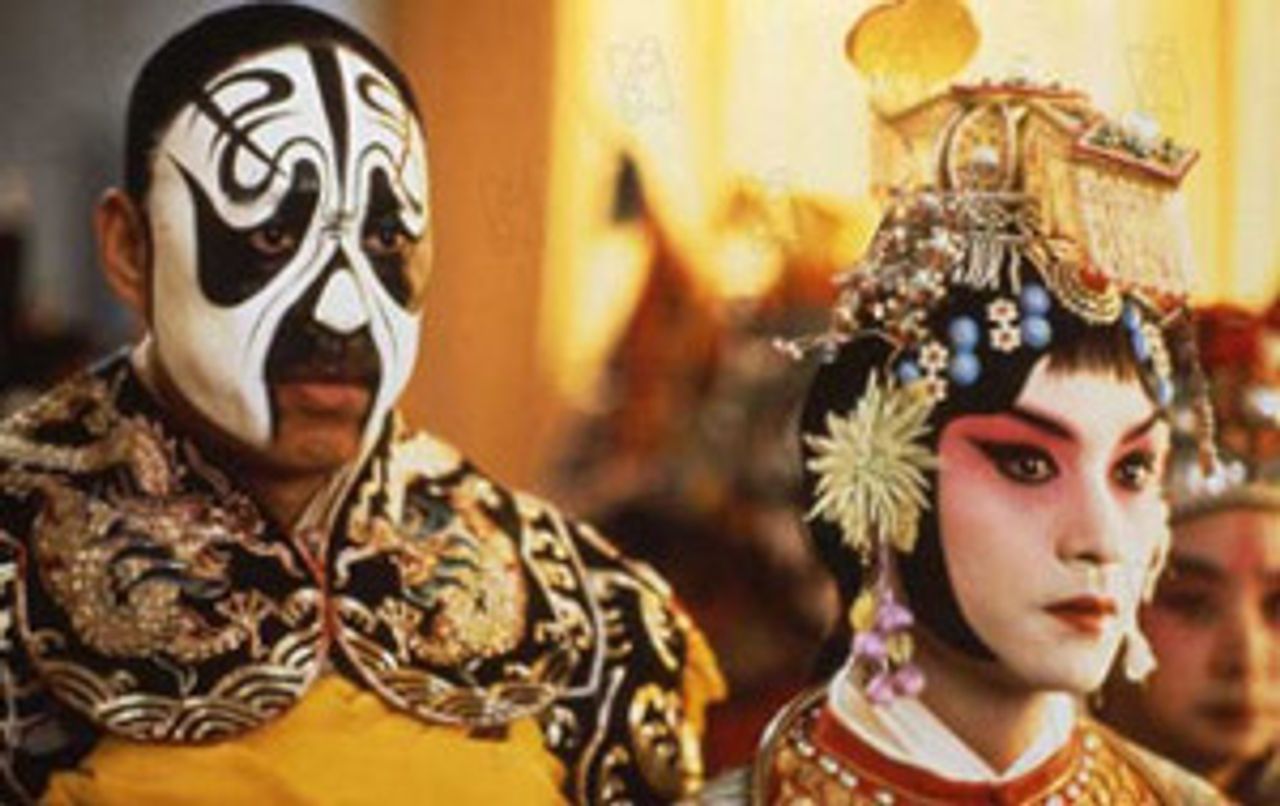 Farewell My Concubine
Farewell My ConcubineSome of these films were unreleasable, and at other times they were released. On other occasions, such as movies like Yellow Earth, they were released after they’d been altered. Chen Kaige’s Farewell My Concubine [1993] was complicated. It wasn’t released at first, but can now be shown in theatres under restricted conditions, but not on TV. Of course, anything can be bought on DVD, because it’s largely a pirated, bootleg system and completely unregulated.
During the post-Cultural Revolution period, the system of state-run film studios was gradually modified. Again, I’m not an expert, but I think the studios no longer received a full state subsidy, but had to start using ticket receipts to make up the budgets and to start working, at least partially, with commercial box offices in mind. They still had a state mandate to turn out Zhu Xuan Lu movies or mainstream propaganda films, which roughly translated means “main melody songs”, but they had to make some films that attracted audiences.
Main melody films promote whatever the propaganda apparatus is focusing on at any given time. Typically these are biographies of important leaders or key policy issues decided by the Politburo. At the moment they’re about environmental protection issues and ethnic harmony films, which show happy minorities singing and dancing, under the benevolent but watchful eye of the central government. The studios make them, but often they’re not even released because, with one or two exceptions, no one goes to watch them.
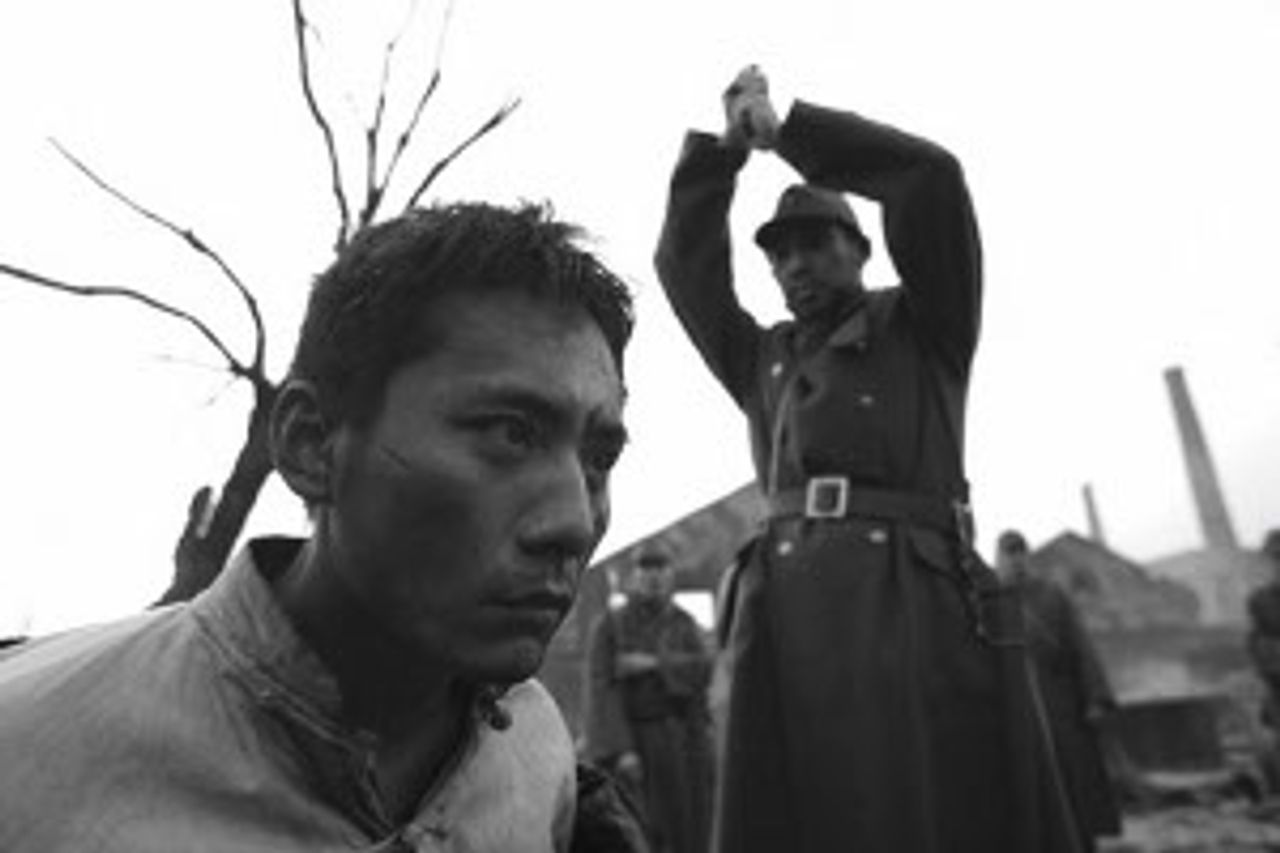 City of Life and Death
City of Life and DeathRP: Would Lu Chuan’s City of Life and Death, on the Nanjing massacre, come under this category? It was screened at last year’s Sydney Film Festival.
SK: Not really, but there was a bit of a controversy about it. The Nanjing massacre is obviously a highly sensitive topic and so the filmmaker had to go through lots of levels of negotiations with the authorities. I imagine there were compromises because China’s policy towards Japan goes through periods of being manipulated—heated up and cooled down—because the Chinese government often uses anti-Japanese nationalism as a political trigger when it feels that it needs to do.
Many people interpreted the film, especially Westerners, as a kind of adversarial film that worked outside the ideological scripture of the Chinese government. I wrote an article arguing the opposite; that the film was a new kind of mainstream Zhu Xuan Lu or main melody film but in liberalish, humanistic clothes. There was some controversy about my article.
Zhang Yimou is now in post-production on a film about the same subject. I’m presuming it will be much closer to the official historical, ideological view than Lu Chuan’s film. Zhang Yimou has migrated all the way from being a populist avant-garde artist with adversarial ideological undertones to someone organising mass state celebrations such as the Beijing Olympics.
RP: And that transformation occurred over 10 or 15 years?
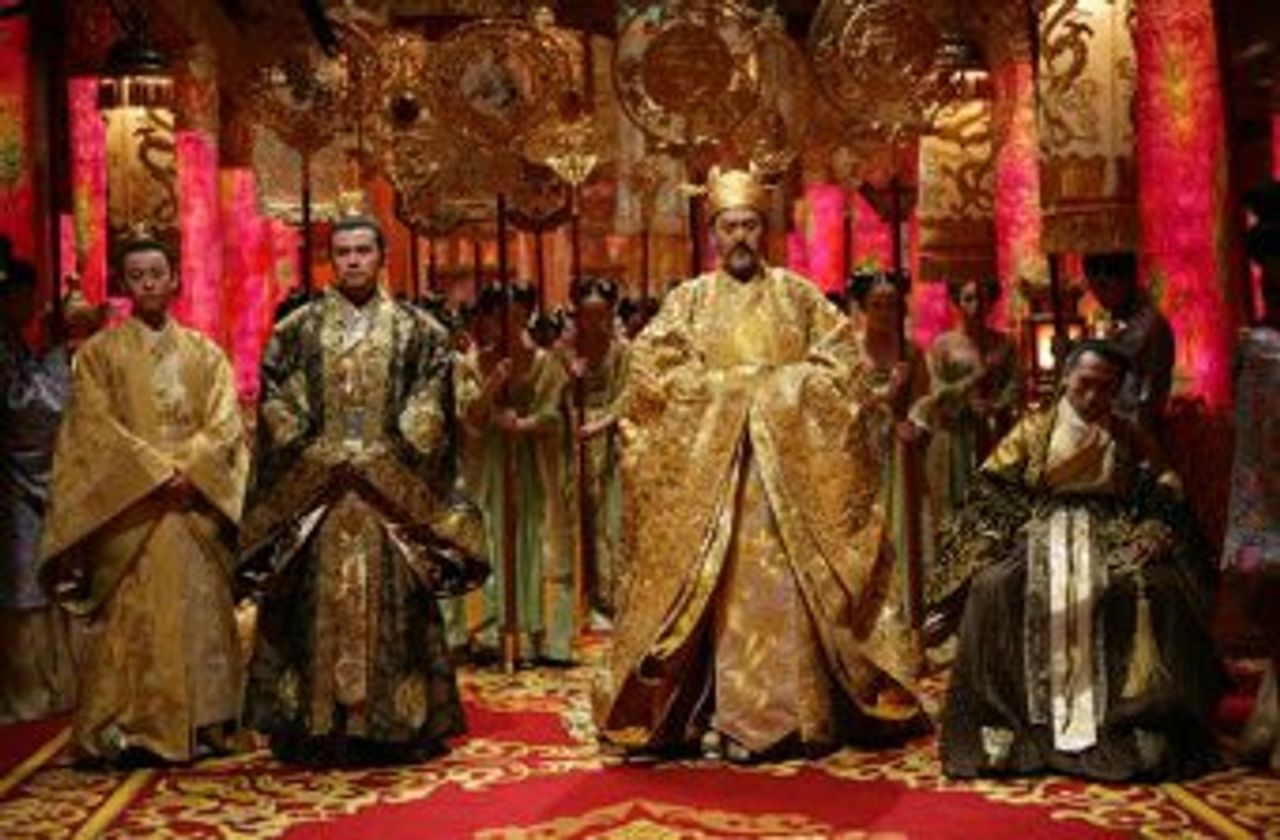 Hero
HeroSK. His film Hero [2002] was a turning point for a lot of people because it seemed to justify the absolute rule and unlimited violence used by the first emperor Qin Shi Huang as necessary for preservation of national unity. (See WSWS review along these lines.) People were rather surprised that he made this sort of film but, in fact, every movie since then has been within this sort of political framework. And his work outside cinema has been mass government propaganda—dance and song celebrations like the Olympics—so this is one of the things he specialises in now.
RP: Could you further elaborate on the unofficial sector and how these films are distributed?
SK: Before I do that, there was another phase in the evolution of the Chinese film system during the 1990s and which allowed private companies to make films. Distribution of these films, however, is totally state-controlled. Everything must go through the China Film Group and a smaller associated company, which tells theatre operators what they can show. Even the powerful Huayi Brothers organisation, which is the most productive private film company, and the Bona Film Group, all have to negotiate their releases through the Chinese Film Group.
RP: Are there many privately owned cinemas?
SK: It’s a mixture. There are a lot of Hong Kong theatre chains aggressively opening up in China. I really don’t know all the details, but I think they’re allowed up to 49 percent ownership. They are privately owned, but if they have 35mm projection—or the new digital replacement for that—they can only show movies that have the film bureau’s seal of approval. All films are under the supervision of SARFT, or the State Administration of Radio, Film and Television, with the film bureau handling censorship.
Independent filmmaking is a completely different set-up and one that’s really changed since I’ve been there, in particular in the way that Chinese people can watch these films and the support that filmmakers receive. When I arrived in 2003, if you wanted to see an independent film you heard by word of mouth where it would be screened—either in a cafe, bar or maybe a little art gallery … it was rather ad hoc.
Since then there’s been a steady development of alternative ways of exhibiting independent films and Chinese film festivals have sprung up. There’s at least five independent festivals that I know of. There’s two in Songzhuang, the artists’ village near Beijing—about an hour from Beijing but close enough that people can still get there.
Every year they have a Beijing Independent Film Festival, and in spring an independent China documentary festival, which is financed by the Li Xianting Film Fund. Li Xianting is an extremely important art critic, who was one of the first to support what exploded into the multi-million dollar Chinese art film phenomena.
The fund also supports some low-scale productions and, equally importantly, it has built two small theatres of about 100 seats in Songzhuang. All this is done on the side of what is officially permitted. The organisers are very careful to calibrate their profile; to keep it low enough so that it doesn’t attract undue attention from the local culture administration, who are supposed to be responsible for controlling things like that. The culture bureaucrats don’t really want to take too much responsibility and if you don’t force them to submit a report on you, they’re happy and you’re happy.
There is also the Chinese Independent Film Festival every October in Nanjing and the most important documentary festival is called Yunfest in Kunming, Yunan Province. Guangzhou has a more experimental, art-related annual film event as well. In addition there are permanent spaces in Beijing, in various art gallery zones and especially the 798 art district, which has regular independent film screenings. Every couple of weeks they’ll screen something that on paper can’t be shown in movie theatres, but they get away with it because it’s in an art gallery theatre. They get full audiences.
In the last few months, however, since the Arab revolutions in February, these events, which sections of the government were prepared to allow, have been constricted and sometimes in quite serious ways.
The Beijing independent documentary film festival at Songzhuang scheduled for May this year, for example, was cancelled. The organisers were told that they needed to submit all their films to the relevant authorities for approval. They decided that they were not going to do that. The Beijing Queer film festival was also shut down in June. They weren’t allowed to go ahead, but released a press statement saying that they had “guerrilla screenings”.
RP: Do the authorities given any official explanation?
SK: It’s procedural. One rarely gets any clarity about policy. What typically happens is that the organisers are called to a meeting and they politely request that you submit your film list to them. You decide then whether to do it or not.
What was strange about the cancellation of the Beijing documentary film festival in May was that it still went ahead to some extent. There were foreign guests invited, I attended and we watched films in their office space on DVD. It was very low-key and had no outside audiences. On the first night, there was a sort of banquet—a really fancy meal—which was sponsored by the culture authorities who had shut down the festival a few days earlier. It was very weird.
RP: How do you see the general direction of Chinese independent cinema: the artistic problems and political pressures?
SK: That’s a big question, because there’s such a wide variety, but it seems to me that documentaries are the most interesting. In the digital age, independent filmmaking is easy and there are lots of young people who want to get out and shoot reality.
This makes a lot of sense to me because the Chinese reality is something that’s so fraught with ideological misunderstandings, and Chinese history is completely ideologised. In schools there are large parts of history that you can’t discuss and that’s the case on TV and obviously in state-approved films.
Chinese reality is changing so fast that documentary filmmakers want to capture bits of contemporary life before it disappears and to examine the margins to discover the kind of reality that doesn’t make it into the mainstream discourse. There’s also interest in capturing the history that hasn’t made it into the official Chinese history text books. Independent documentaries are going in all sorts of politically brave and aesthetically fascinating directions.
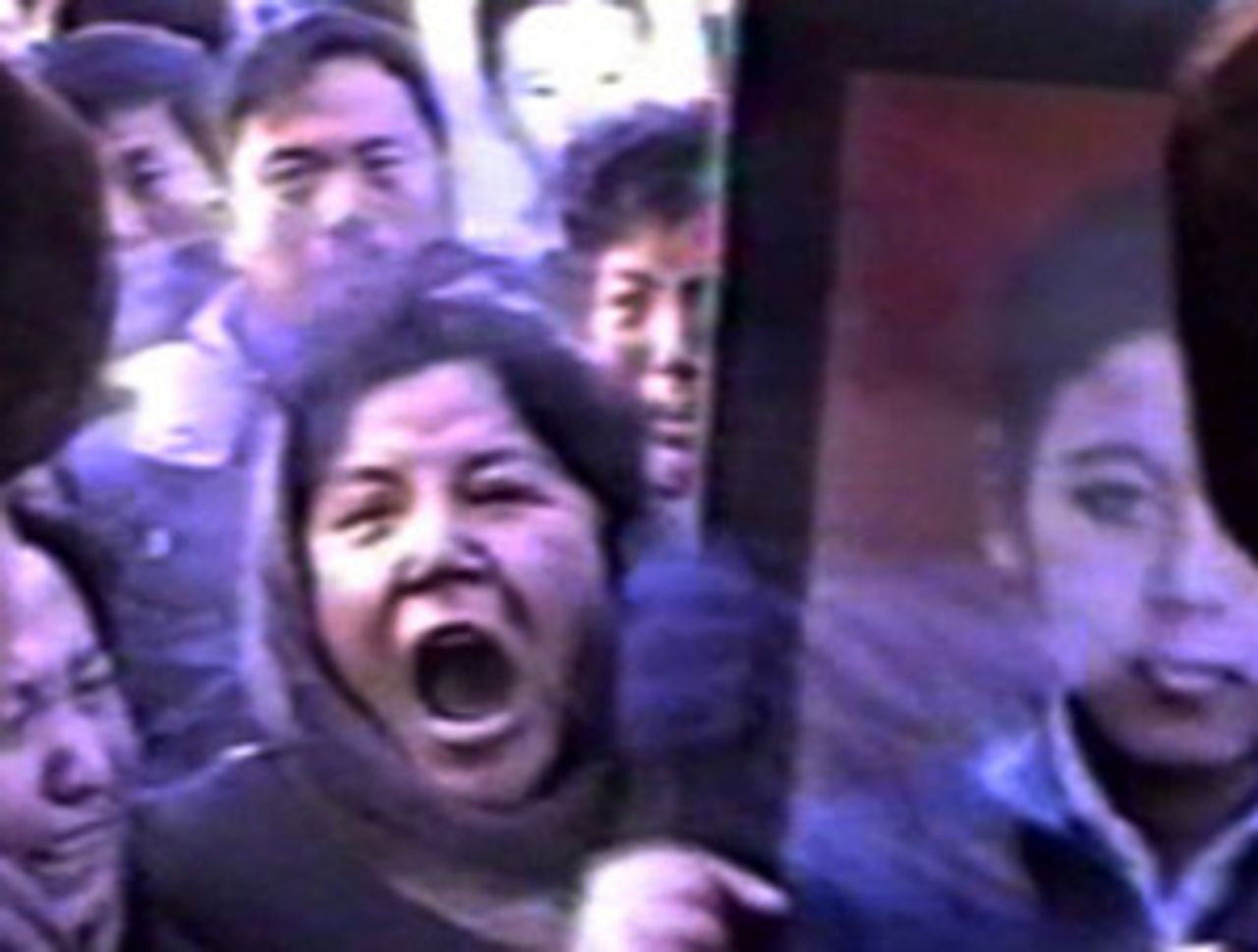 Karamay
KaramayKaramay by Xu Xin, which was screened at the Vancouver film festival last year, for example, is a fascinating six-hour documentary. It’s about a fire which occurred in 1994, in a town called Karamay in western Xiaoxihu, during a student performance for regional leaders. It was notoriously covered up by the government, compensation was not offered and, oddly, a lot of the leaders escaped from the fire, but the kids were locked inside and died. The filmmaker, meticulously and with a beautiful sense of structure, digs deeply into this event. He interviews parents of the dead kids who are incredibly articulate about what this trauma meant to them and the response of the Chinese governments.
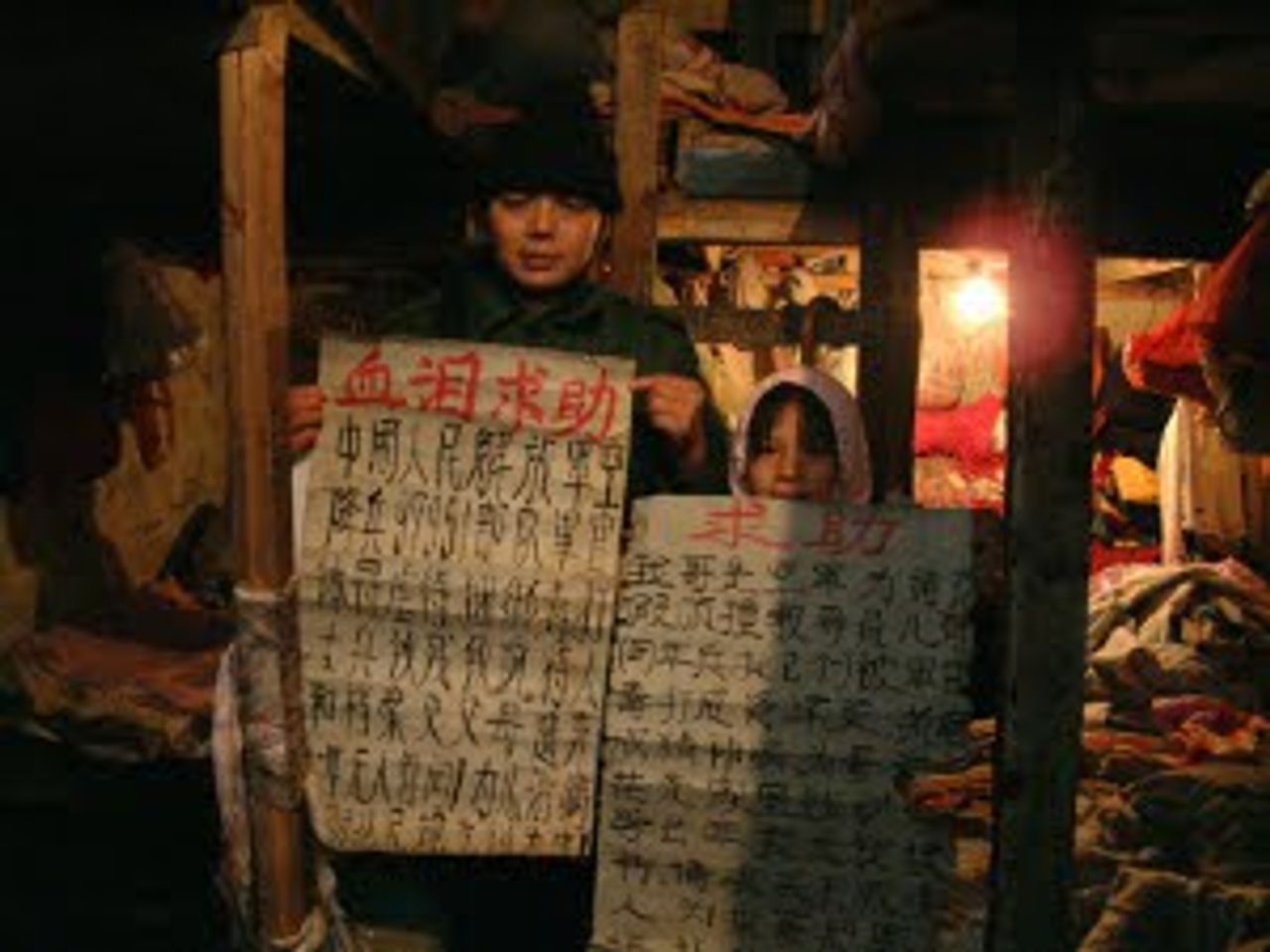 Petition
PetitionI want to mention another film, Zhao Liang’s Petition, which is a five-hour epic, a fantastic documentary about petitioners in Beijing. These are people who are at the end of their rope. If you’ve been maltreated by officials in your home town or at the provincial level, there’s a formal final recourse: you take your complaint to the official petition office. These petitioners lead horrible lives, staying for years in Beijing trying to submit their forms. They get kidnapped by local officials who don’t want the form to be submitted to the central government. The director Zhao Liang spent years with these people and it’s an amazing, fascinating, angry and beautiful work.
I don’t want to give the impression that all the interesting films are politicised, adversarial movies. These films are incredibly important, but in certain ways they tend to tell Westerners the sort of things that they think they already know about China—the government repression and so on. This is certainly one aspect of the Chinese reality, and one that I obviously don’t defend, but it’s not the only thing. China is a society rapidly heading in every possible direction and all at once.
There is capitalist economic freedom for a newly created middle class, but no increase in freedom for sections of the intelligentsia who are trying to oppose a repressive government. The Chinese government is deliberately creating a class of people who have invested in wealth and property and want stability and are automatically defenders and clients of the new ultra-capitalist Chinese government’s policies.
RP: Are any Chinese filmmakers exploring contemporary history in the way that some of the Taiwanese films did in the 1990s?
SK: There’s Hu Jie, he’s a historian-filmmaker who has had a couple of amazing films about the Cultural Revolution. He uses archival material, interviews people and he is involved with some other filmmakers in a long-term project. Wang Bing is also involved in this sort of project, filming testimonies from people who suffered from the various government campaigns—from the anti-rightist campaigns at the end of the 1950s, to the Cultural Revolution from ‘66 to ‘76. There’s a lot of work being done there and very much outside the system because it’s such a taboo topic.
RP: Isn’t it relatively safe to denounce the Cultural Revolution, given that many of those in the Chinese government were elevated during the Deng Xiaoping period?
SK: Yes, you would think so, but I should distinguish between different cultural media. There are things you can do in literature, the visual arts and to a certain extent on TV, but film is the last place where this is allowed. Criticism of things like the Cultural Revolution and the anti-rightist campaign still impinges on the legitimacy of the Communist Party to rule. Any topic that questions the government’s legitimacy in ways, even around the edges, is kept tightly under control.
RP: When did the independent documentary emerge?
SK: It started at the beginning of the 1990s with people like Wu Wenguang, who did the first digital documentaries, and it has been rolling on since then. These people originally came out of television in the late 80s when there was an odd kind of freedom on some of state-run TV to show deep and searching kinds of intellectual documentaries. Some of those people moved into independent production and that’s where Chinese independent documentary came from.
RP: How do you see its trajectory, its development from here on?
SK: Every year I find more and more films submitted to me and there continues to be creative and interesting work. I haven’t even mentioned “personal documentaries”, which seems to be a new kind of trend. Instead of focusing the camera outwards on social problems, such as poverty and other issues, the camera is reflexively focused back on the filmmaker and is an intense, intimate and personal kind of filmmaking. Diversity is increasing and I’m very positive about the future of Chinese independent documentary.
RP: How do you see your work, what are your general aims?
SK: I don’t like the old fashioned idea of Western experts setting themselves up as the gateways or portals through which approved Chinese or Asian works can pass into the film festival system and through those into the distribution system.
What I hope I’m doing is finding and making available to Western audiences the most creative and surprising Chinese documentary and fiction films—ones that add to our sense that China is more complex than we think and that provide certain details about this complexity. Hopefully this encourages people to try and work out for themselves what kinds of things are going on in China and why we should care.
Another way I do this, is by spending a lot of time talking with Chinese critics, curators, producers and scholars to discover what they regard as important in filmmaking and what they want Chinese audiences to see. I hope my selections and advocacy of certain kinds of films for screening at Vancouver and other film festivals, for example, reflect this.
To be continued
